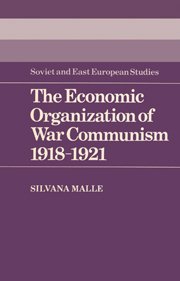Book contents
Summary
The short but lacerating experience of war communism may be epitomized by Lenin's rhetorical question at the Tenth Party Congress, two and a half years after the seizure of power: ‘How could one start a socialist revolution in a country like ours without dreamers?’
War communism, indeed, embodied the inner contradiction of the Bolshevik Revolution, which officially appealed to criteria and principles of scientific socialism but, in fact, stemmed from the contrasting impulses and tensions of a recent economic take-off, dramatically challenged by war. The October Revolution was born out of a dream, in spite of the lesser or greater realism which may have guided the new leadership, in capturing power. This dream united workers' claims for better standards of living, soldiers' prostration before the massacre of war, the peasants' claims to land ownership, the aspirations of young and passionate intellectuals to freedom of expression and creative imagination, and the aspirations of technocrats to modernization of the economic machinery. The leaders of the revolution had no precise ideas about feasible alternatives; they thought, however, that their government would have enough support to establish economic control over production and distribution. But this also belonged to the pre-revolutionary dream.
The co-existence and urgency of each single tension or aspiration which provoked the February Revolution were at the same time the reasons for what Berdiaev defined as the paradox of the Russian fate and revolution. The liberal ideals, the ideals of justice, that is reformism, were considered to be Utopian in Russia, while Bolshevism, which seemed to offer a global solution encompassing each problem, appeared less illusory, more realistic and adequate to the situation of 1917.
- Type
- Chapter
- Information
- The Economic Organization of War Communism 1918–1921 , pp. 495 - 514Publisher: Cambridge University PressPrint publication year: 1985

